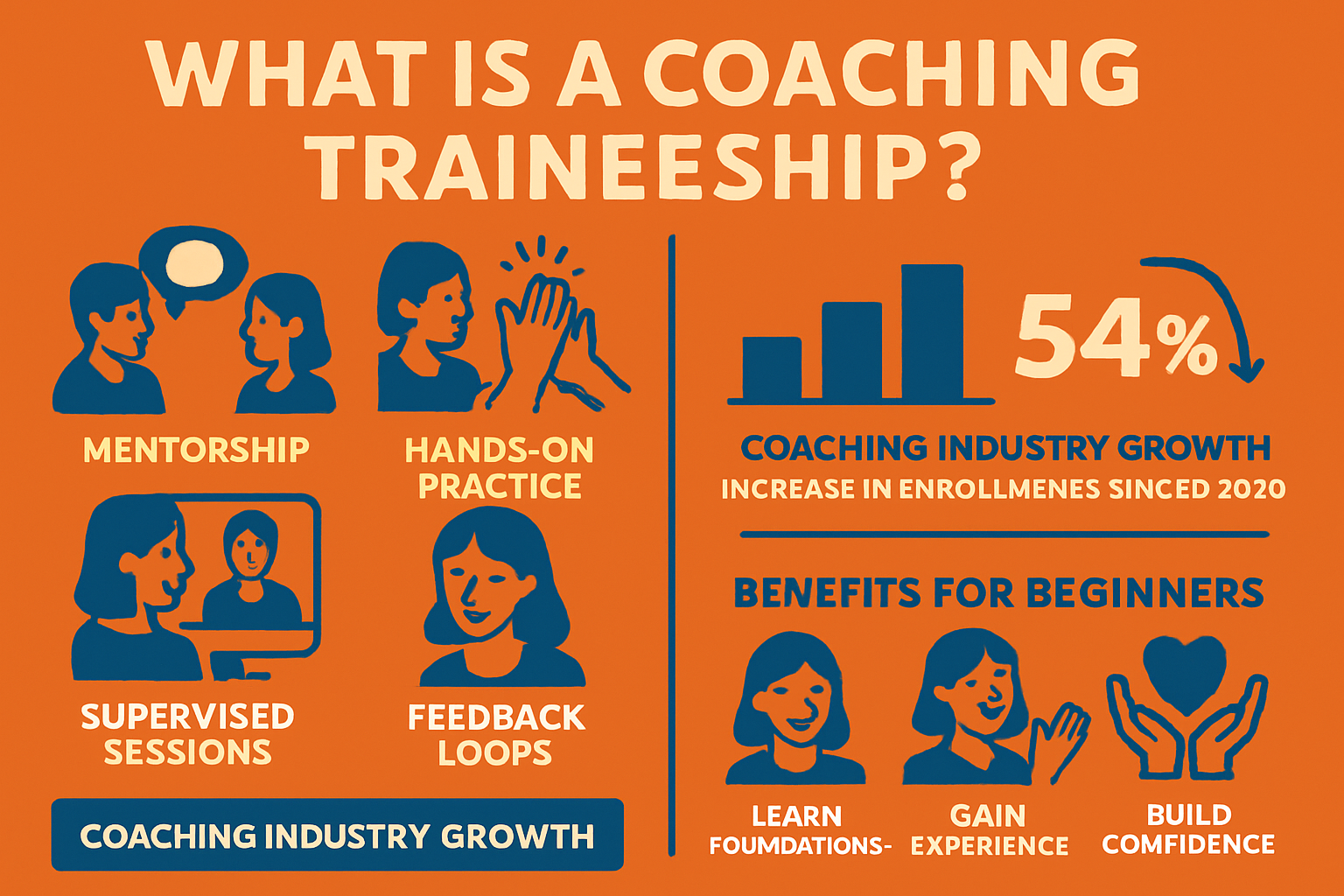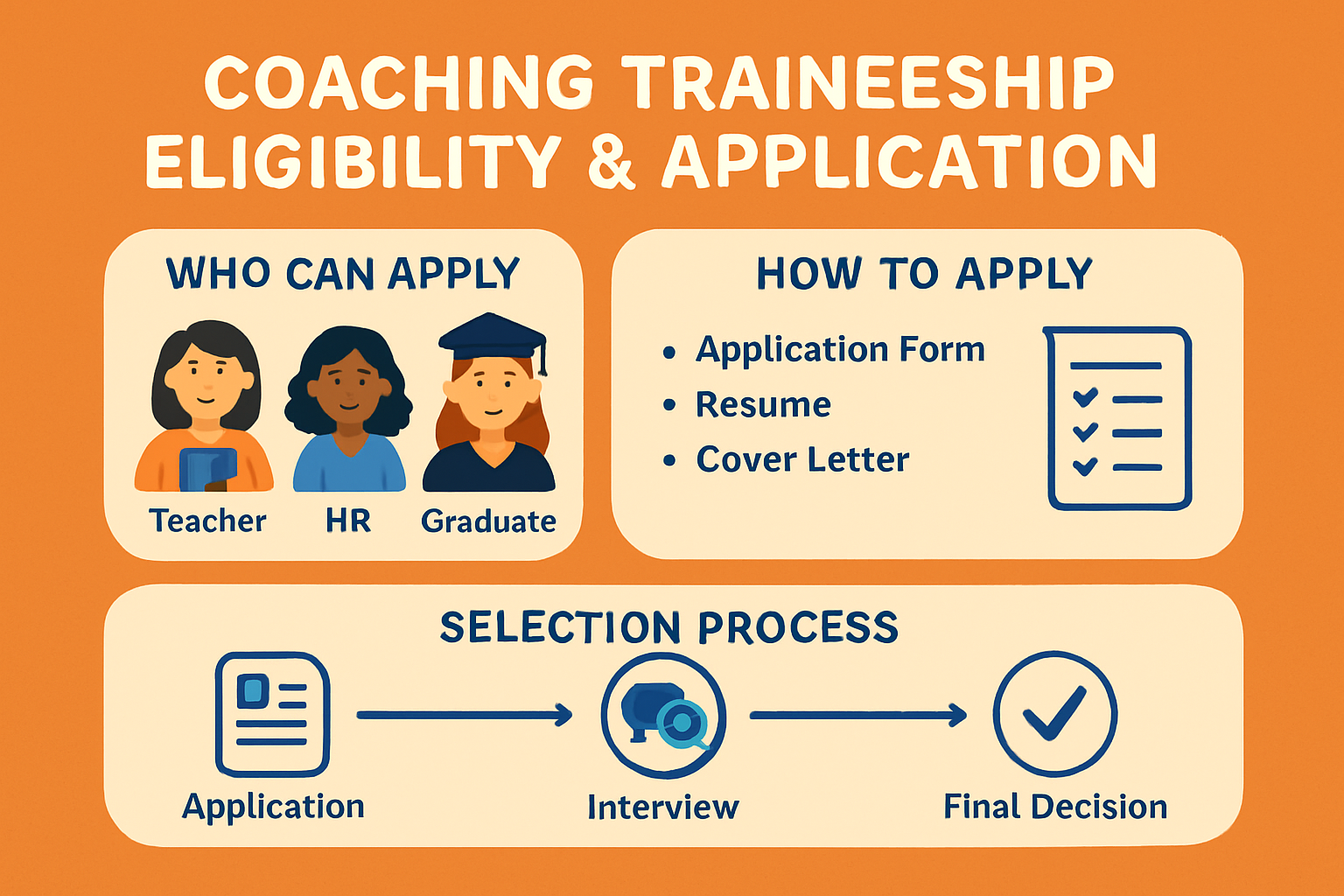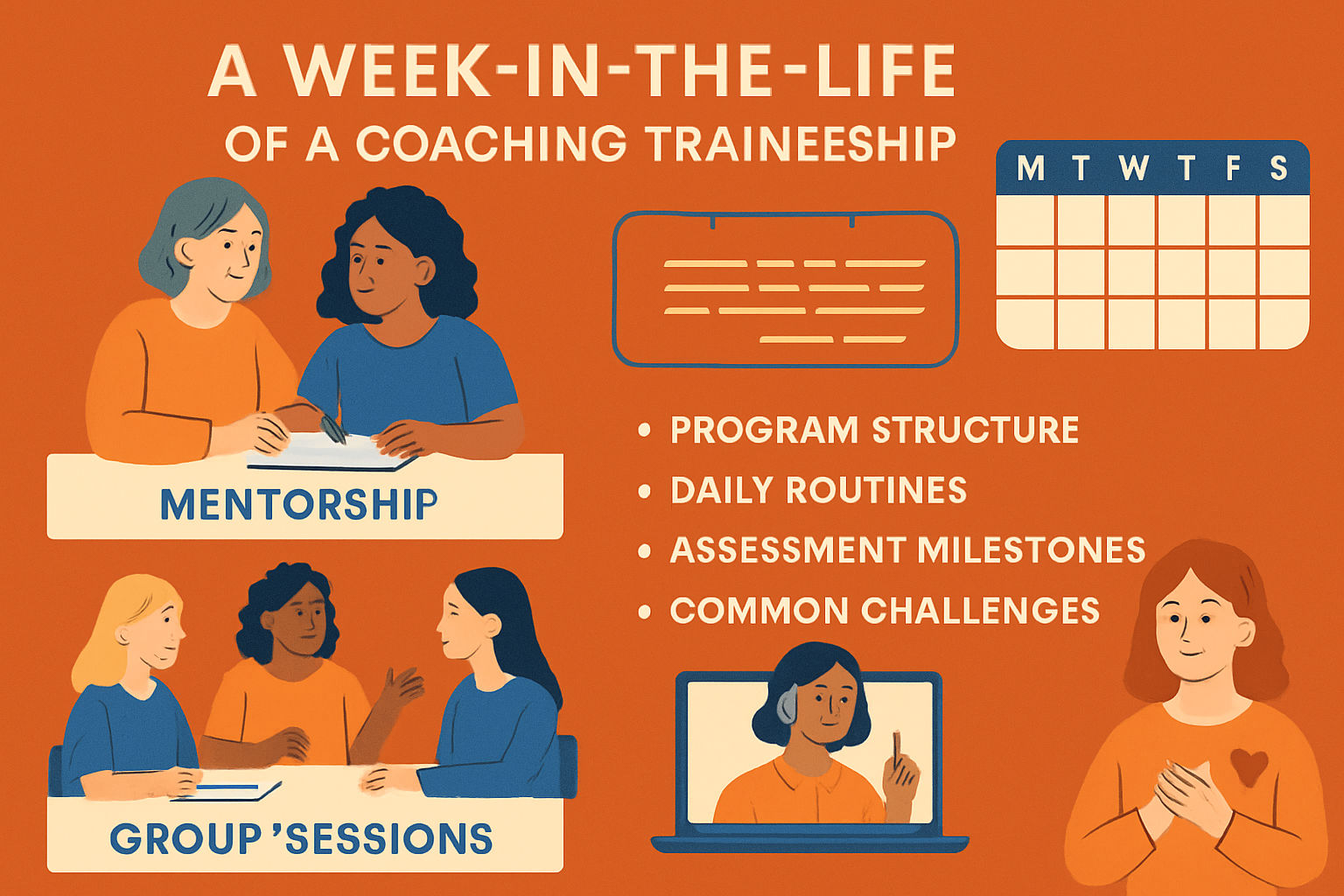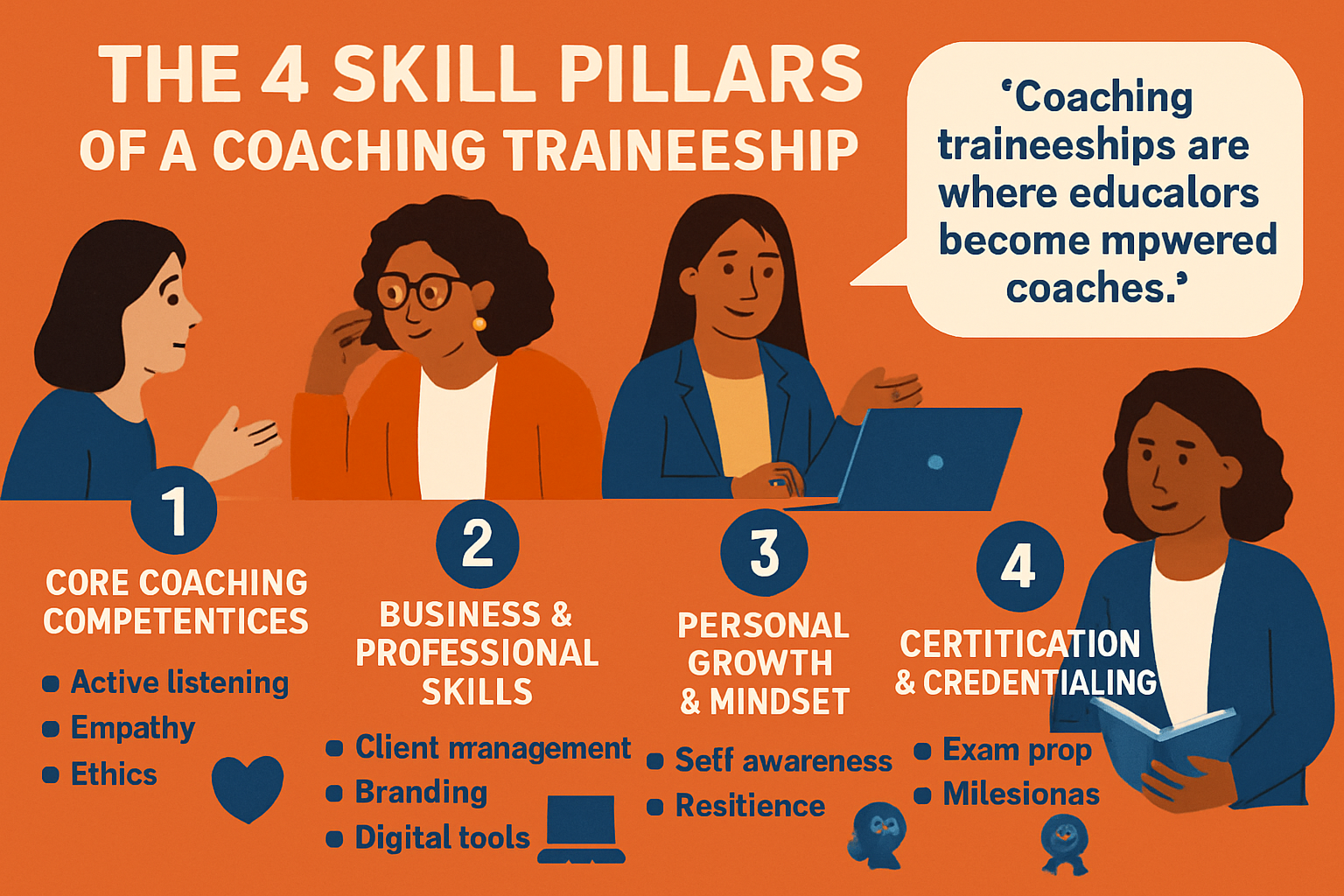Posted on August 26, 2025 by Don Markland
Did you know that coaching traineeships are now the fastest-growing pathway into a deeply rewarding coaching career for 2025? As demand for skilled coaches soars, more people than ever are launching their journeys through a coaching traineeship designed for real-world impact.
This guide is here to demystify the coaching traineeship process for beginners. You’ll get step-by-step insights, from choosing the right program to building the skills and confidence needed to thrive.
Ready to explore eligibility, daily life, essential skills, and future career pathways? Let’s dive in and set you up for coaching success.
What is a Coaching Traineeship?
Curious about what sets a coaching traineeship apart in today’s world? At its core, a coaching traineeship is an immersive, structured pathway designed to launch aspiring coaches into fulfilling careers. Unlike traditional internships or classroom-based training, these programs blend hands-on practice with expert mentorship, creating a dynamic environment for real growth.
A coaching traineeship typically includes a mix of live coaching sessions, supervised practice, and ongoing feedback. Trainees are paired with experienced mentors who guide them through the complexities of client work, helping bridge the gap between theory and real-world application. This dual focus ensures that learning is both practical and deeply rooted in core coaching principles.
Let’s break down the structure. Most coaching traineeships are organized around weekly or bi-weekly mentorship meetings, supervised coaching hours, and group workshops. Trainees often shadow professional coaches, participate in peer learning groups, and receive detailed feedback on their sessions. The result? Graduates leave with not just knowledge, but also the confidence and skills needed to thrive.
Definition and Overview
A coaching traineeship is a guided learning journey where aspiring coaches gain practical experience under the supervision of seasoned professionals. It’s different from a standard internship because it emphasizes mentorship and personal development, not just task completion. Trainees work directly with clients, often in real or simulated settings, while receiving structured feedback loops to hone their skills.
What makes a coaching traineeship unique is its blend of classroom learning and hands-on practice. While some programs start with foundational theory, most quickly transition into live coaching scenarios. Here, trainees learn to adapt, problem-solve, and grow through real client interactions. The structure is carefully crafted to prioritize both skill-building and reflective practice.
Mentorship is central to every coaching traineeship. Trainees are supported by experienced coaches who provide guidance, monitor progress, and offer encouragement. This relationship fosters a growth mindset and helps trainees navigate challenges with confidence. In short, a coaching traineeship is a transformative, supportive environment designed for accelerated learning and professional readiness.
Types of Coaching Traineeships
Coaching traineeships come in a variety of forms, each tailored to specific interests and career paths. The most popular types include:
- Life coaching traineeships: Focus on personal development, goal-setting, and work-life balance.
- Executive coaching traineeships: Target leadership skills, organizational change, and performance in corporate settings.
- Business coaching traineeships: Emphasize entrepreneurship, team dynamics, and small business growth.
- Specialty coaching traineeships: Address niches like wellness, relationship, or career coaching.
Program formats vary, too. Some traineeships are delivered in-person, providing face-to-face mentorship and networking. Others are fully online, offering flexibility and global connections. Hybrid programs combine both, making learning accessible without sacrificing depth.
Here’s a quick comparison:
| Type | Focus Area | Format | Unique Features |
|---|---|---|---|
| Life | Personal goals | In-person/Online | Emotional intelligence |
| Executive | Leadership | Hybrid | Corporate partnerships |
| Business | Entrepreneurship | Online | Real-world business cases |
| Specialty | Niche topics | In-person | Targeted skill-building |
Each coaching traineeship is designed to meet specific learner needs, ensuring there’s a perfect fit for every aspiring coach.
Industry Growth and Demand
The coaching traineeship landscape is booming. Recent data shows a 54% increase in trainee enrollments since 2020, reflecting a surge in people seeking meaningful, flexible careers. Organizations are investing more in coaching talent pipelines, recognizing the value of skilled coaches in driving team performance and employee well-being.
According to Coaching industry growth statistics, the global coaching market’s rapid expansion is expected to continue through 2025. Credentialed coaches are in high demand across industries like tech, education, healthcare, and finance. This trend is fueled by a growing awareness of coaching’s impact on productivity, engagement, and culture.
Employers now seek professionals who have completed a coaching traineeship, as it signals both competence and commitment. As a result, graduates often enjoy strong job prospects and opportunities for advancement.
Benefits for Beginners
Why choose a coaching traineeship as your entry point? The advantages are clear:
- Accelerated learning: Fast-track your coaching skills with hands-on experience.
- Real-world exposure: Work with clients and receive actionable feedback.
- Professional networking: Build connections with mentors, peers, and industry leaders.
- Increased employability: Credentialed trainees are attractive to employers and clients alike.
- Earning potential: Many graduates report higher starting salaries and faster career growth.
Beginner success stories abound. For example, one recent trainee transitioned from teaching to coaching and landed her first client within weeks of finishing her program. Another built a thriving online practice by leveraging skills and contacts gained during her traineeship.
A coaching traineeship doesn’t just teach you how to coach—it helps you start your journey with confidence, purpose, and a supportive community.

Eligibility, Requirements, and Application Process
Starting a coaching traineeship can feel like stepping into a new world. Understanding who qualifies, what’s required, and how to apply makes the process much less daunting. Let’s break down exactly what you need to know to get started.

Who Can Apply?
A coaching traineeship welcomes candidates from a variety of backgrounds. Recent graduates, career changers, HR professionals, and aspiring entrepreneurs are all commonly accepted. Many programs value diversity, seeking applicants who bring unique perspectives to the coaching field.
While some coaching traineeship programs may require a bachelor’s degree, many focus more on soft skills and potential. The most sought-after traits include empathy, active listening, and a strong desire to help others grow. Programs typically value applicants who can demonstrate maturity and self-awareness, regardless of age.
Age and experience requirements vary. Some coaching traineeship opportunities are open to those just starting out, while others prefer candidates with professional or life experience. To stand out, highlight your communication skills and genuine passion for coaching in your application materials.
Key Application Components
Applying for a coaching traineeship usually involves several core components:
- An up-to-date CV or résumé
- A motivation letter explaining your interest in coaching
- Professional references (sometimes two or three)
- Occasionally, a short video introduction
Most programs also require an interview or an assessment, such as a role-play or case study. This helps evaluators understand your readiness and fit for a coaching traineeship.
To increase your chances, tailor your CV and letter to the specific program. Highlight any relevant experience, even if it’s informal mentoring or volunteer work. Showcasing your commitment to personal growth and your understanding of the coaching traineeship journey can set you apart from other applicants.
Selection Criteria and Timelines
Selection for a coaching traineeship is based on a combination of personal qualities and potential. Recruiters look for strong communication skills, empathy, a growth mindset, and dedication to the coaching profession. Many programs align their criteria with ICF accreditation standards, so reviewing these can help you prepare.
Application timelines vary. Some programs have fixed annual start dates, while others offer rolling admissions. It’s common to see deadlines in late spring or early summer for fall cohorts. Acceptance rates can range from 15% to 40%, depending on program popularity and capacity. Typical applicant profiles include people with strong interpersonal skills, openness to feedback, and a clear motivation for pursuing a coaching traineeship.
By understanding what’s expected and preparing thoughtfully, you’ll be ready to take the next step toward launching your coaching traineeship journey.
Inside a Coaching Traineeship: What to Expect
Stepping into a coaching traineeship is a transformative experience that blends structured learning with real-world application. Whether you’re new to coaching or making a career pivot, knowing what to expect helps you get the most from your traineeship journey.

Program Structure and Daily Experience
A typical coaching traineeship lasts from 3 to 12 months, offering flexibility for various schedules. Most programs require 8–20 hours per week, balancing structured learning with practical experience.
Your daily experience revolves around key pillars:
- Mentorship sessions: Weekly or biweekly meetings with experienced coaches
- Hands-on practice: Shadowing, supervised coaching, and real client sessions
- Group workshops: Collaborative learning and peer feedback
- Independent study: Reading, journaling, and reflection
A coaching traineeship is designed to immerse you in both theory and practice. Expect to alternate between observing master coaches and leading your own sessions under supervision. This rhythm ensures you build confidence and competence quickly. By the end of your coaching traineeship, you’ll have a clear sense of professional routines and expectations.
Learning Methods and Tools
Learning in a coaching traineeship is dynamic and interactive. Expect to engage in:
- Role-play scenarios that simulate real client challenges
- Case studies to analyze successful and difficult coaching situations
- Live coaching sessions with feedback from mentors and peers
Digital tools are central to modern coaching traineeship programs. You’ll use platforms for video conferencing, session scheduling, and secure feedback. Many programs introduce coaching software early, ensuring you’re comfortable with industry-standard tools.
Self-reflection is woven into the learning process. Journaling and regular check-ins help you track your growth and identify areas for improvement. This blend of methods nurtures both your technical and interpersonal coaching skills.
Supervision and Mentorship
Supervision is a cornerstone of every coaching traineeship. Mentor coaches and supervisors guide your development, offering practical advice and emotional support. You’ll participate in:
- Structured feedback sessions after observed coaching
- Regular one-on-one meetings to discuss progress and goals
- Group supervision for shared learning and networking
Many trainees leverage directories like Find a life coach near you to connect with mentors and expand their professional network. These relationships often last beyond the coaching traineeship, providing ongoing guidance as you launch your career.
Mentor-trainee bonds can be transformative, fostering both skill development and personal growth. You’ll gain insights not just about coaching, but about your own strengths and values.
Assessment and Progress Tracking
Progress in a coaching traineeship is measured through a combination of practical and reflective assessments. Common methods include:
| Assessment Method | Description | Frequency |
|---|---|---|
| Observed sessions | Live or recorded client sessions | Monthly |
| Written reflections | Journaling and self-assessment | Weekly |
| Client feedback | Structured forms or interviews | After each cycle |
| Performance reviews | Mentor-led evaluations | Midpoint/final |
You’ll hit key certification milestones throughout your coaching traineeship. Leading programs report completion rates above 85%, with high success rates for certification exams. This structured feedback loop ensures you stay on track and can confidently demonstrate your coaching abilities.
Challenges and How to Overcome Them
Every coaching traineeship presents its own set of challenges. Common hurdles include:
- Imposter syndrome: Doubting your readiness or skills
- Time management: Balancing traineeship with other commitments
- Client acquisition anxiety: Worrying about finding practice clients
Resilience is key. Many trainees find that talking openly with mentors, setting realistic goals, and celebrating small wins helps maintain momentum. Embracing a growth mindset turns challenges into valuable learning opportunities.
Recent trainees emphasize the importance of community—connecting with peers, sharing experiences, and supporting each other. Remember, every coach starts somewhere, and facing these challenges is part of your unique journey.
Essential Skills Developed During a Coaching Traineeship
Embarking on a coaching traineeship is more than just learning techniques—it’s about transforming the way you communicate, support others, and grow professionally. The skills cultivated during a coaching traineeship are the foundation for a successful, impactful career, regardless of your chosen coaching niche.

Core Coaching Competencies
A coaching traineeship is designed to instill the essential competencies every coach needs. These skills go beyond theory, forming the backbone of effective coaching relationships.
Key competencies developed include:
- Active listening: Tuning in to clients’ words, tone, and emotions.
- Powerful questioning: Asking open-ended, purposeful questions that spark insight.
- Goal-setting and accountability: Helping clients define and achieve meaningful objectives.
- Empathy and rapport-building: Creating a safe, non-judgmental space for growth.
- Ethical practice: Respecting confidentiality and following professional standards.
Throughout your coaching traineeship, you’ll apply these skills in supervised sessions, receive feedback, and steadily gain confidence in your approach.
Business and Professional Skills
A successful coaching traineeship also prepares you for the practical side of coaching. You’ll learn how to manage sessions, track progress, and grow your professional presence.
Key business and professional skills include:
- Client management: Scheduling, communication, and maintaining records.
- Session planning: Structuring sessions to maximize client outcomes.
- Marketing basics: Building your brand, networking, and creating an online presence.
- Digital tools: Using coaching software, video conferencing, and secure feedback platforms.
As you progress through your coaching traineeship, you’ll discover how these skills empower you to support clients and build a sustainable practice.
Personal Growth and Mindset
Personal transformation is at the core of every coaching traineeship. You’ll experience growth in self-awareness, emotional intelligence, and resilience as you learn to navigate challenges and feedback.
Key elements of personal growth include:
- Self-reflection: Regular journaling and feedback loops.
- Emotional intelligence: Understanding your emotions and those of your clients.
- Resilience: Overcoming setbacks and embracing a growth mindset.
Many trainees find that their coaching traineeship not only improves their professional abilities but also enriches their personal lives, helping them become more effective educators and leaders.
Certification and Credentialing
Completing a coaching traineeship sets you on the path to professional certification. Most programs are aligned with respected bodies like the International Coaching Federation (ICF) or EMCC.
- Popular credentials: ICF ACC, EMCC Foundation, and others.
- Exam preparation: Practice sessions, observed coaching, and written reflections.
- Success rates: Leading programs report high pass rates for trainees who complete all requirements.
For a deeper dive into the importance of credentials and how to achieve them, check out this Coaching accreditation guide.
Your coaching traineeship doesn’t just teach you skills—it opens doors to recognized credentials, professional growth, and a fulfilling career.
How to Choose the Right Coaching Traineeship Program
Selecting the best coaching traineeship program can feel overwhelming, but breaking down your options into clear criteria makes the process manageable. The right fit accelerates your growth and sets the foundation for a fulfilling coaching career.
Factors to Consider
When evaluating a coaching traineeship, start by examining accreditation. Look for programs recognized by respected bodies like the ICF or EMCC, as these add credibility and ensure you receive high-quality training. Industry reputation also matters—seek feedback from alumni and check how graduates fare in their careers.
Mentorship quality is another pillar. A strong coaching traineeship pairs you with experienced mentor coaches who offer guidance and honest feedback. Review the curriculum depth to ensure it covers both theory and hands-on practice, including specialized tracks like business or holistic coaching. If you’re curious about innovative approaches, you might find inspiration in Holistic life coaching approaches.
Consider flexibility in scheduling. Some programs offer part-time or self-paced formats, which can be crucial if you’re balancing work or family. Finally, weigh cost, available scholarships, and the potential return on investment. A reputable coaching traineeship should provide clear data on graduate outcomes and earning potential.
Researching and Comparing Programs
Start your search by reading authentic reviews and testimonials. Alumni stories offer a window into the real experience and can reveal strengths and weaknesses not listed in brochures. Speaking directly with program advisors or current trainees helps clarify expectations and support structures.
To compare options, create a table listing factors like length, format, mentorship, and price. For instance:
| Program Name | Accreditation | Format | Duration | Cost | Specialty |
|---|---|---|---|---|---|
| Program A | ICF | Online | 6 months | $3500 | Business Coaching |
| Program B | EMCC | In-Person | 9 months | $4200 | Life Coaching |
| Program C | ICF | Hybrid | 4 months | $2900 | Executive |
If you’re drawn to a particular niche, explore specialty programs such as those focused on business coaching. You can explore business coaching opportunities to see what’s available and how those pathways align with your goals.
Keep notes on each program’s unique features, mentorship style, and alumni results. This approach makes your coaching traineeship decision more objective and less stressful.
Online vs. In-Person Traineeships
One of the biggest choices you’ll make is between online, in-person, or hybrid coaching traineeship formats. Online programs offer flexibility and can connect you with a global community, ideal if you need to fit study around other commitments. In-person traineeships, on the other hand, provide immersive, face-to-face learning and direct networking.
Hybrid models are gaining popularity in 2024, blending virtual learning with occasional in-person workshops. This approach combines flexibility with meaningful peer and mentor interaction.
When deciding, reflect on your learning style and availability. Online options may suit self-motivated learners, while in-person formats can be energizing for those who thrive on group dynamics. No matter the format, a well-chosen coaching traineeship will help you build the skills and confidence to launch your coaching journey.
Career Pathways After a Coaching Traineeship
After completing a coaching traineeship, you’ll find a range of career pathways waiting for you. Whether you dream of joining a dynamic team or building your own practice, the next steps are both exciting and rewarding. Let’s explore your options and how to make the most of your new coaching skills.
Employment and Self-Employment Options
Graduates of a coaching traineeship can choose between employment and self-employment. Many new coaches start by joining established coaching firms or taking in-house roles within organizations. These positions offer structure, peer support, and often a steady client flow. Alternatively, launching a private coaching practice provides flexibility and autonomy, allowing you to shape your services and schedule.
Here’s a quick comparison of typical first roles and salary benchmarks:
| Role | Typical Salary Range (USD) | Setting |
|---|---|---|
| Entry-Level Coach | $40,000 – $55,000 | Coaching Firms |
| In-House Corporate Coach | $50,000 – $70,000 | Organizations |
| Private Practice Owner | Varies ($30k–$100k+) | Self-Employed |
According to coaching industry market size data, the sector is projected to keep expanding through 2025, creating robust demand for skilled coaches. Choosing employment offers stability and mentorship, while entrepreneurship gives you creative freedom. Weigh your values and lifestyle as you decide which path fits you best, knowing your coaching traineeship has prepared you for both.
Building Your Coaching Practice
If you’re drawn to independence, building your own coaching practice after a coaching traineeship is a rewarding journey. Start by clarifying your niche—do you want to focus on life coaching, executive development, or helping educators thrive? Defining your audience will guide your marketing and outreach.
Key steps to attract and retain clients include:
- Creating a professional website and online presence
- Sharing testimonials from your coaching traineeship experience
- Networking at industry events and local meetups
- Offering free workshops or webinars to showcase your expertise
Ongoing professional development is essential. Keep learning through advanced courses, supervision, and peer feedback. Remember, many successful coaches build their client base gradually, leveraging connections made during their coaching traineeship. Consistency and authenticity are your best marketing tools.
Long-Term Growth and Specialization
A coaching traineeship is just the beginning of a lifelong learning journey. As you gain experience, you may choose to specialize further—options include executive, wellness, team, or educational coaching. Advanced certifications, such as ICF PCC or EMCC Practitioner, open doors to new markets and higher earning potential.
Long-term growth can also involve mentoring future trainees, leading workshops, or even developing your own training programs. The coaching industry is expected to grow steadily through 2030, offering increasing opportunities for leadership and impact. Your coaching traineeship equips you with not just foundational skills, but also a mindset for continuous growth and specialization. Whatever path you choose, your journey as a coach can evolve as you do.
If you’re feeling inspired to kick off your coaching journey after reading about the structure, skills, and career possibilities a traineeship can offer, you’re not alone. The next step is making yourself visible to potential clients and mentors who can help you grow—even if you’re just starting out. With tools and resources designed specifically for new coaches, you can begin building your practice and reputation right away. Ready to take the first step and get noticed in the coaching community? Get Your Free Listing and start connecting with people who are looking for someone just like you!
